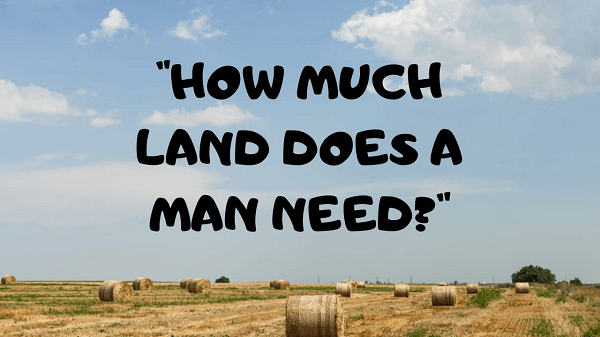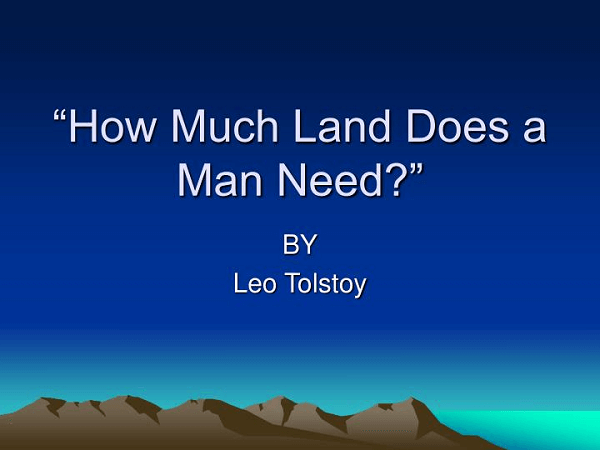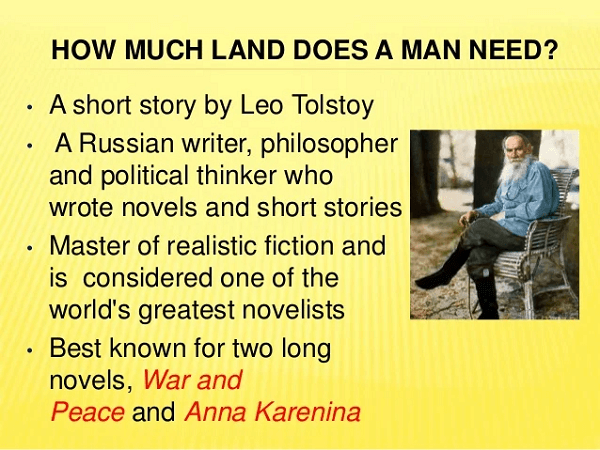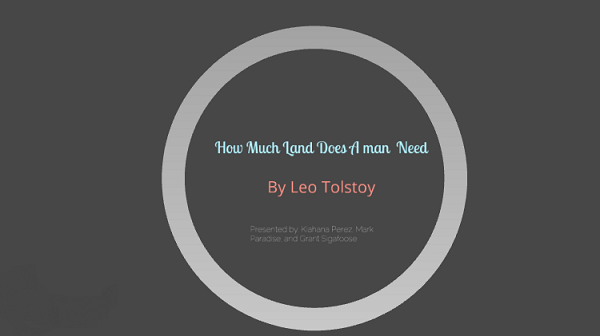How Much Land Does a Man Need Summary by Leo Tolstoy"How Much Land Does a Man Need?" is a short tale by Leo Tolstoy, the famous 19th-century Russian novelist, short story, and essay writer. The story was first distributed in 1886 and was converted into English in 1906 by Louise and Aylmer Maude in an assortment of Tolstoy's short fiction named 23 Stories (1906). This adaptation has been republished a few times and is utilized in this aide (distributed by Oxford College Press in 1967). "How Much Land Does a Man Need?" retells a Russian folktale about a peasant's longing for land and its repercussions. Tolstoy composed the narrative in his late fifties when he thought all work should convey a moral message. It has had a long and lasting influence on readers. 
The story comprises nine parts. In Part 1, a lady visits her more youthful sister, who lives in the country. The senior sister, who is hitched to a dealer in a town, discusses every one of the upsides of town life: fine garments, great food, excursions to the theatre, and different things. This pesters the more youthful sister, who is hitched to a town laborer. She says she wouldn't exchange her working life; she and her better half might never develop rich, yet they will continuously have enough, though rich individuals frequently lose all they have. According to the city, she encompasses individuals with enticements from the Devil. Lying in the oven nearby, the more youthful sister's significant other, Pakhom, hears what they are talking about. He concurs with his significant other, yet he thinks they need more land. Assuming he had more land, even the Devil wouldn't have the option to entice him. The Devil, sitting hidden in the room, hears this boast and decides to give Pakhom more land to entangle him. In Part 2, a woman who owns a large estate near Pakhom appoints a steward who punishes peasants whose livestock trespass onto the land. Pakhom is irritated every time he has to pay a fine. At the point when the woman decides to sell the land, the workers attempt to coordinate for their cooperative to get it, yet the Devil drives them to dispute about how to make it happen. Finally, the land is sold individually to peasants who can afford it. Pakhom collects sufficient cash to buy 40 sections of land. He is currently a landowner and appreciates great yields. He is content. In Part 3, Pakhom's bliss is destroyed while dairy steers have a place with some adjoining laborers who stray onto his region. For some time, Pakhom endures these intrusions, yet later he concludes that he should show the laborers a thing or two and compels them to pay fines. The workers despise this and store resentment toward him. After five of Pakhom's lime trees are destroyed, Pakhom faults a man named Simon for the deed. He goes to Simon's home but sees nothing implicating him. There is a preliminary and, afterward, a retrial, yet Simon is vindicated for the absence of proof. Pakhom blames the appointed authorities for taking pay-offs and squabbles further with his neighbors. During this period, Pakhom finds that many peasants are leaving the hamlet, which he feels would allow him to acquire more land. A passing laborer illuminates him that many individuals have moved to an area many miles away on the opposite side of the Volga River. Each peasant now has 25 acres of beautiful land. Pakhom's interest has been piqued. He visits the new local area in the mid-year and is satisfied with what he sees. He returns home in the autumn and sells everything he possesses. He and his family will migrate to the new local area in the spring. At the point when he shows up (Part 4), the community of an enormous town gives Pakhom and his children 125 sections of land for their utilization. Pakhom has a lot of arable lands, and there is a lot of space for him to pasture his cows; however, he craves to develop more wheat than his property can oblige. To deal with the issue, he rents land from a merchant; in any case, this requires moving the wheat he creates there more than 10 miles to the town. By and by, his harvests are great, and he continues the course of action for a considerable time. By then, at that point, he has become burnt out on renting and needs to possess land instead. He haggles with a laborer and will purchase 1,300 sections of land from him; however, at that point, a passing seller returning from the far-off Bashkir land lets Pakhom know that he purchased 1,300 sections of land there for very little cash. The vendor gave the Bashkir bosses a few gifts, and they were glad to sell their territory. That's what Pakhom understands if he somehow managed to do likewise, he would get 10-fold the amount of land for less cash than he was ready to pay the laborer. Pakhom and a worker travel more than 300 miles to the Bashkirs in Part 5. The journey takes them almost seven days. They find that the Bashkirs live in felt-shrouded tents along a river. They do not farm the land but possess livestock and horses. The ladies milk the cows and get ready kumiss from the milk. Men like eating mutton, playing pipes, and drinking kumiss. They welcome Pakhom generously, offering him food and drink, and Pakhom offers them presents like tea and wine. They then ask Pakhom which of their possessions he prefers so that they can give him what he desires. Pakhom says that he is extraordinarily fascinated with their property, which is better than the land where he comes from. The Bashkirs talked among themselves for quite a while and subsequently offered him as much land as needed. In any case, they need to affirm this with their Boss. 
In Part 6, the Bashkir chief comes, and Pakhom offers him tea and a nice dressing robe. The Chief immediately accepts when his soldiers inform him of the potential land trade. He also adds he will give a deed to the land at Pakhom's request so there would be no issues. At that point, the Chief advises Pakhom that the land cost would be 1,000 rubles daily. Pakhom is baffled, and the Chief makes sense that he can have however much land he can stroll around in a day. If he doesn't return to his beginning area by then, he will relinquish his 1,000 rubles. In Part 7, Pakhom plans to walk a circuit of 35 miles the following day. He lies there thinking of how he will manage the land. Not long before the first light, he nods off and has a fantasy wherein he hears somebody outside the tent laughing. In the fantasy, he heads outside and finds that the man laughing loudly is the Boss. At the point when Pakhom asks him for what valid reason he is laughing, he sees that the man is currently the vendor who educated him concerning the Bashkirs. Pakhom will ask the man when he sees that he isn't the seller yet the laborer from quite a while who enlightened him concerning the land on the opposite side of the Volga. Pakhom then sees that the figure is the Devil and that before him lies a dead man: Pakhom himself. Terrified, he stirs. He comprehends that dawn is drawing closer, and he gets up and goes to the Bashkirs, letting them know the opportunity has arrived to start estimating the land. Part 8 starts with Pakhom and the Bashkirs collecting on a hillock. Pakhom sets off toward the rising sun, occasionally uncovering openings and heaping pieces of turf. He strolls about three miles as the day warms up. He removes his undercoat and continues. Then, he takes his boots off, making walking clear. He strolls for his thought process another three miles, digs an opening, and goes to one side. Around the early afternoon, he sits and rests for some time, after which he continues walking for quite a while. When he makes another turn, he sees the Bashkirs sitting tight for him on the hillock, appearing very far away. He chooses to limit the third side of his territory, yet he gets stressed when he understands he has strolled under two miles on that side. He has far to go, yet the sun is soaking overhead. He chooses to hustle back in an orderly fashion, even though that will make his property disproportionate. In Part 9, Pakhom is drained and finds it hard to walk, yet, in any case, he strolls increasingly fast and afterward breaks into a run, discarding his jacket, boots, and cup. He hears the Bashkirs hollering, encouraging him, and sees that the sun is close to the horizon. Pakhom recalls his fantasy and thinks he might bite the dust. When the sun sinks beneath the skyline, his despondency increases; however, at that point, a last expectation comes: The Bashkirs are on higher ground and can, in any case, see the sun. He races to the highest point of the hillock before collapsing. As he falls forward, he figures out how to contact the Main's cap, where his cash lies and the Boss pronounces that Pakhom has gained a ton of land. In any case, when Pakhom's specialist hurries to him, he observes that Pakhom is dead. The worker digs a grave and covers him. After taking a stab at so long to get land, all the land Pakhom needs presently is six feet. Themes1. The Futility Socioeconomic AscensionPakhom initial craving to become a landowner is reasonable: up portability will purportedly concede him financial independence and ease his coercion to the privileged's double-dealing and abuse of laborers. Notwithstanding, Pakhom faces enormous difficulties in his journey to secure however much land as could reasonably be expected: he ventures into the red, walks many miles, forsakes his family, loses his sympathy and moral conventionality, and lastly, passes on from weariness. At the point when Pahom meets his downfall, Tolstoy portrays monetary rising as an infeasible undertaking ? as well as a minor one. Pakhom energy and obligation to land ownership total to the covering of his dead body in a little grave, as affirmed by the finishing line of the story: "Six feet from his head to his heels was all he needed". Despite the many sections of land, Pakhom buys throughout the long term, his pursuit for abundance makes no difference in death. 
2. PowerlessnessDebilitation swarms Pakhom life, both as a worker and a landowner. As a laborer, he should pay the fighter's silly fines for minor offenses beyond his reach. He wishes to become a landowner to initiate his independence, hoist his living circumstances, and escape underlying class limits. In any case, in any event, when he gains many sections of land and climbs to a higher financial status, Pakhom sticks to the goals of a monetary framework that compares property possession with opportunity. Along these lines, he feels caught and unfulfilled in every last one of his legacies and leaves on a passionate pursuit of more land to attain a rewarding and meaningful life. This pursuit is full, as Pakhom is trapped in an inescapable cycle that won't ever arrive at a point of complete satiation. His endeavors to attain opportunity, amusingly, lead to discontent and capture. Through this, Tolstoy presents the subject of illusionary independence in the mission for up portability. 3. God and The Devil's ControlTolstoy shows how strict elements, notwithstanding financial associations, control a man's life. In Part 1, the Devil chooses to entice Pakhom with land, hastening his twisting into voracity and bad habit. In Part 2, the Devil also accentuates the peasants' discontent when they seek - but fail - to evenly distribute the land. The Devil's ability to lead individuals down morally perilous pathways demonstrates humanity's propensity to fall to evil. Unlike the Devil, God doesn't show up as a real person in the story, yet regardless significantly influences Pakhom feeling of freedom of thought. While endeavoring to safeguard a customary concurrence with the Bashkirs, Pakhom credits his shortfall of freedom over his future to God: "Life and death are in God's hands. You good people give it to me, but your children might wish to take it away again". Additionally, as he battles to arrive at the hillock in Part 9, he again questions on the off chance that God will permit him to appreciate material outcome later on: "There is plenty of lands...but will God let me live on it? I have lost my life; I have lost my life!". Here, Pahom perceives God's ability to determine his destiny and extreme passing. Using the Devil and God couple, Tolstoy alerts against placing an excess of significant worth into desire and material riches, as we are likely to have outside powers who can fix these customary markers of achievement. 4. The Exploitative Upper ClassA commitment to generating benefits and accumulating material belonging defines the more well-off characters in the story. The limit of this portrayal shifts among various characters; for instance, the richer sister boasts about her status and admittance to shallow extravagances in the city. Others, like Pakhom and the innkeeper, effectively utilize their key, influential place to maintain workers' inconsistent status in the public arena. Initially parts of the story, Pakhom drives forward through the manipulative fierceness of the more extravagant class. The old warrior, who turns into the female landowner's property administrator, upholds fines on Pakhom and different laborers in the collective for minor offenses unchangeable as far as they might be concerned, for example, dairy cattle wandering into the landowner's domain. Despite Pakhom desolation because of the manipulative privileged, he forces significantly crueler, more unreasonable fines on workers when he becomes a landowner. He esteems the obtainment of riches, influence, and social capital over moral respectability and sympathy toward workers ? and, accordingly, propagates the actual pattern of dehumanization and inequity he wishes to get away with. 
5. GreedTolstoy portrays avarice as a terrible force that may consume and ruin a person's character. To acquire as much land as possible, Pakhom experiences great turbulence and begins disregarding ideals of community, compassion, and morality: he takes advantage of peasants' precarious financial situations, sells goods, gets into debt, and abandons his family. His quest for monetary success breeds greater greed and unfulfillment. He is never happy with his endowments, even in Part 4, where he develops many yields and has great harvests, claims threefold the amount of land as he did in past domains, and offers bountiful local area land. Pakhom large land purchases make him desire more, culminating in an uncontrollable greed that propels his rush to seize Bashkirian land even as he physically deteriorates. |
 For Videos Join Our Youtube Channel: Join Now
For Videos Join Our Youtube Channel: Join Now
Feedback
- Send your Feedback to [email protected]
Help Others, Please Share









